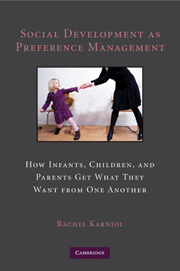 Social Development as Preference Management
Social Development as Preference Management Book contents
- Frontmatter
- Contents
- Acknowledgments
- Introduction
- 1 The Baby “Preference Game”
- 2 Children's Expression of Preferences
- 3 Emerging Meta-Preferences
- 4 Other People's Preferences
- 5 Parenting and Preference Management
- 6 Channeling Children's Preferences
- 7 Temporizing Preferences
- 8 Restricting Children's Preferences
- 9 Disciplining Noncompliance
- 10 Planes of Transformational Thought: Temporal, Imaginal, and Mental
- 11 Manipulating Others
- 12 Coping and Self-Regulating
- 13 Mind Play: Applying Transformational Thought
- 14 Minding One's Own Versus Others' Preferences: Altruism, Aggression, and Morality
- 15 Tying Up
- References
- Subject Index
- Name Index
9 - Disciplining Noncompliance
Published online by Cambridge University Press: 05 June 2012
- Frontmatter
- Contents
- Acknowledgments
- Introduction
- 1 The Baby “Preference Game”
- 2 Children's Expression of Preferences
- 3 Emerging Meta-Preferences
- 4 Other People's Preferences
- 5 Parenting and Preference Management
- 6 Channeling Children's Preferences
- 7 Temporizing Preferences
- 8 Restricting Children's Preferences
- 9 Disciplining Noncompliance
- 10 Planes of Transformational Thought: Temporal, Imaginal, and Mental
- 11 Manipulating Others
- 12 Coping and Self-Regulating
- 13 Mind Play: Applying Transformational Thought
- 14 Minding One's Own Versus Others' Preferences: Altruism, Aggression, and Morality
- 15 Tying Up
- References
- Subject Index
- Name Index
Summary
A mother refers to her problems with getting her 4-year-old to eat, saying, ‘We used everything in turn. He was forbidden ice-cream and sweets; we did have a spell when we smacked him, but we gave up, because we don't believe in smacking children if it has no results; and I think we did have a time when he was sent to bed. But we also gave that up pretty quickly, because obviously it had not effect.’
(Newson & Newson, 1968, p. 231)Preferential conflict between parents and their children does not necessarily dissipate when parents temporize or restrict children's preferences. What happens next depends on children's reactions to their preferences being temporized or restricted and on parental responses to children's reactions. In this chapter, I focus on how parents discipline their children and what they do when their children are recalcitrant. In particular, I see disciplinary contexts as ones that entail choice on both the child's and the parent's part as to how to behave. Children can make what parents perceive as wrong choices in continuing to be defiant or avoiding to take responsibility for their misbehaviors. Parents can choose how to respond to their child's behavior; they can prevent or promote the escalation of conflict depending on the strategies they themselves adopt during disciplinary encounters, as discussed below.
ESCALATION OF PREFERENTIAL CONFLICT
When children go along with the imposed restrictions on their preferences, interaction with their parents can generally proceed smoothly. That is, children may acknowledge the conflict but behave in ways that reflect their parents’ preferences rather than their own.
- Type
- Chapter
- Information
- Social Development as Preference ManagementHow Infants, Children, and Parents Get What They Want from One Another, pp. 171 - 189Publisher: Cambridge University PressPrint publication year: 2010


